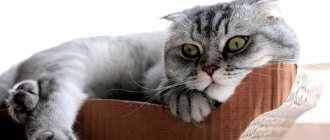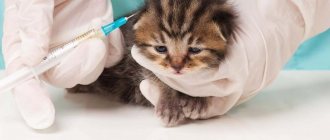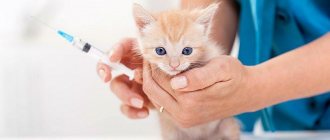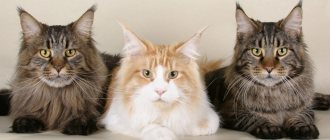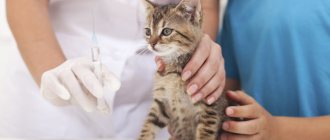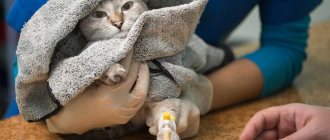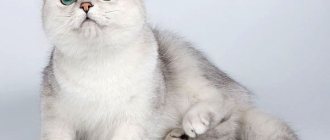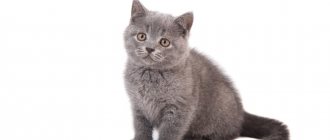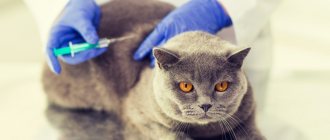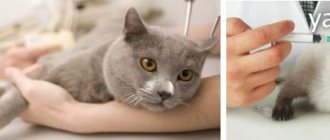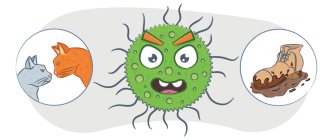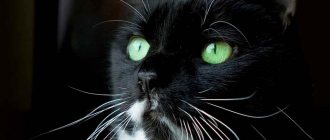As a rule, Scottish Fold kittens do not leave the house most of the time, or even their entire lives. However, even such domestic cats need vaccinations due to their rather weak immune system. “ When should Scottish Fold kittens be vaccinated ? What vaccinations should kittens have? - interests many future and current owners. At what age should a Scottish Fold kitten get its first vaccination? In what order should they be done? How long should there be between injections ? We will try to answer these and other questions in this article. Vaccinations for Scottish kittens should be done and prescribed exclusively by a veterinarian.
Do Scottish Fold kittens who are always at home need vaccinations?
First, let’s answer the question: “How does a Scottish kitten become infected if it is at home?” Various options are possible. Therefore, the question of whether a Scot should be vaccinated is definitely important to decide as soon as possible. For example, the infection can be brought by owners from outdoor shoes. Or, for example, if a kitten sleeps on the doormat , where a person’s foot first steps when he comes home. So even such little things are enough for a young Scottish cat to get sick. That’s how fragile the immune system is in these cute creatures with touchingly floppy ears. A baby can also get sick while in a veterinary center, because there are a lot of sick animals here. Remember that vaccinations for Scottish Fold kittens are not able to protect your pet 100% from diseases, however, they will create decent basic protection, which will subsequently create a strong and healthy immune system.
What are Scots vaccinated against?
Veterinarians recommend vaccinations for all kittens without exception, including isolated animals that do not leave the house.
Vaccination is an effective preventive procedure that prevents the risks of contracting the most dangerous diseases with serious complications and death.
What infections should a Scots cat be vaccinated against:
- Rhinotracheitis is feline herpes, an acute viral disease that affects the upper respiratory tract and visual organs. Infection occurs after contact with an infected animal and through household contact. The virus is also transmitted hereditarily from a mother cat to a kitten. For adult animals, rhinotracheitis is not so dangerous, most often the prognosis is favorable. But for small kittens there are real risks of death. That is why it is very important to carry out timely vaccination against this disease according to the calendar.
- Calcivirosis is a viral disease that affects the respiratory system. The virus, resistant to various influences, is transmitted to domestic cats in different ways. Most often, this disease affects animals in nurseries and shelters, where maintenance rules are not followed and premises are not regularly disinfected. According to statistics, mortality from calcivirus among unvaccinated kittens is observed in 30% of cases.
- Chlamydia is an infectious disease that is often asymptomatic. The insidious virus affects the respiratory system, digestive organs, eyes and reproductive system. The disease is severe and has a high risk of complications. Infection occurs through shared food, contact with a sick animal, airborne droplets and sexual contact.
- Leukemia is a viral disease that affects the immune system of cats. The disease is difficult to treat and has a high risk of death. The infection is transmitted from infected animals by contact, with saliva, shared food, water, etc. The only way to protect your domestic kitten from this dangerous disease is to carry out timely vaccination!
- Panleukopenia is an acute infectious disease that affects the intestinal mucosa. Infection occurs in different ways: contact, household, airborne droplets. A cat owner can also bring a dangerous virus into the house along with dust on shoes or clothes. The treatment is complex. For vaccinated animals, the prognosis is often favorable, but kittens that are not vaccinated against panleukopenia, in most cases, die from an insidious virus that attacks the cells of the bone marrow and immune system.
- Rabies is a deadly disease transmitted through the saliva of an infected animal. Even a person can get rabies if they are bitten by a sick cat. To date, there is no effective treatment for this disease. All animals infected with rabies are doomed to death. The only protection against this terrible disease is vaccination according to age.
Vaccination schedule for Scottish kittens
For the convenience of the owners, we have compiled a vaccination schedule for the Scottish Fold kitten . Then your adorable kittens will receive all the necessary injections on time. And the graph looks something like this:
- Panleukopenia - the very first vaccine - 8 weeks, 2nd vaccine - 12 weeks, should be repeated annually. Vaccination is mandatory.
- Calcivirosis - first vaccine - 8 weeks, 2nd vaccine - 12 weeks, should be repeated annually.
- Feline rhinotracheitis - first vaccine - 8 weeks, 2nd vaccine - 12 weeks, should be repeated annually. Vaccination is mandatory.
- Chlamydia - first vaccination 12 weeks, 2nd vaccination 16 weeks, must be repeated annually, this vaccination is recommended.
- Leukemia - first vaccine - 8 weeks, 2nd vaccine - 12 weeks, should be repeated annually. Vaccination is recommended.
- Rabies - 3 months, re-vaccination is not necessary, it must be repeated annually, it must be done.
Of course, even if you do all these injections, no one guarantees 100% protection against diseases. But this is an important part of developing the animal’s immunity, because it is so important to provide protection at such a tender age.
Types of vaccines for kittens
Complex vaccinations, which are given to kittens at three months of age, do not contain a vaccine against rabies, the most common and dangerous disease among pets. But the first stage of vaccination will protect your furry pet from the viruses of panleukopenia, rhinotracheitis and calicivirus. Often, the first trivalent vaccine also includes antibodies that help in the fight against chlamydia in adult cats. After some time, when the vaccine takes effect, revaccination is usually done using the same drug. This will help the kitten’s body to quickly develop lasting immunity against a specific disease.
The next stage of vaccination is vaccination against a disease that affects stray animals - rabies. Moreover, it is important not to miss the opportunity to perform such a procedure for those owners whose pets will be outside the city and walk the streets on their own. A popular vaccine for domestic cats is an injection that subsequently protects against ringworm and microsporia. It is usually carried out last. Thus, by 8-9 months of life, the kitten will have strong immunity to many infectious diseases. After all, forewarned means forearmed.
When to start vaccinations for Scottish Fold kittens?
This issue is being debated among different breeders, veterinarians and owners. However, veterinary experts recommend administering the vaccine no earlier than 3 months. So, until this age, the animal should be protected from close contact with relatives, and also avoid places with large concentrations of animals, for example, markets or exhibitions .
List of vaccines for children aged 3 to 18 years
From 3 to 18 years of age, repeated vaccinations and revaccinations are also indicated. They are necessary because the drugs used do not provide lifelong immunity.
| Age | Vaccine |
| 6 years | Mumps (mumps), measles, rubella - revaccination |
| 6-7 years | Tetanus, diphtheria – revaccination II BCG – revaccination I |
| 13 years | Viral hepatitis B, rubella |
| 14 years | Tetanus, diphtheria – revaccination III Poliomyelitis (“live” drug) – revaccination III |
The pediatrician decides whether vaccinations can be done. He evaluates whether there are any contraindications, which include:
- allergic reaction to yeast;
- newborn weight up to 2 kg;
- allergy to egg white;
- allergy to aminoglycosides;
- primary immunodeficiency;
- acute infections in the body or exacerbation of chronic diseases;
- complications from vaccinations already given;
- seizures, some diseases of the central nervous system.
How to prepare a Scottish Fold kitten for vaccination
Ten days before the date of the intended vaccination, the cat should be dewormed, since the animal must be completely healthy for vaccination.
Products for this procedure can be easily purchased at any pet store. Dewormers should be used 2 hours before the animal eats. This must be done, because in this case there is a greater likelihood that artificial immunity will work properly. It is also necessary to remember that before the injection the animal must be completely healthy and not suffer from any diseases, and also not cough. It is necessary to care for the kitten after the vaccine especially carefully, since the animal has suffered real stress, because no one likes it when a needle is inserted into you, and even in an unfamiliar place. Care consists primarily of minimizing contact with other animals. Nutrition are also very . It should be easily digestible and low in calories. Now you know what vaccinations your kitten needs.
Preparation before vaccination
A couple of weeks before the first vaccine is scheduled, the animal must undergo a mandatory check for the presence of parasites and undergo deworming if necessary. Whatever vaccinations are prescribed, the animal must be absolutely healthy. Most vaccines will not be able to help the body develop sufficient immunity if the internal organs are affected by parasites. By missing such an important stage of preparation before vaccination, there is a huge risk of infection of the pet even after the introduction of implanted artificial immunity. Do not be surprised if the veterinarian refuses to vaccinate due to the presence of worms.
You can get rid of helminths by purchasing special medications for animals at any pharmacy, which are usually given only once a couple of hours before feeding. Contraindications to vaccination include a kitten's loose, unformed stool, weak appetite or its complete absence, and the presence of liquid or purulent discharge from the mucous membranes of the eyes and nose.
How can a veterinarian help your kitten?
Veterinary doctors specialize in providing medical care in a comfortable home environment that only the owner can create. This is why administering injections at home is so important. After the injection, the cat can immediately fall into the hands of a caring owner, who will console him and, of course, give him a treat. Having a doctor visit your home is very convenient, just check out our advantages:
- You don't waste time visiting the veterinary center.
- You can get modern doctor's help.
- Avoid nervous sitting in line.
- You can communicate more productively with a specialist.
All these advantages prevail over the advantages of staying in a regular veterinary clinic. very convenient that you can donate blood, if necessary, at your home. Of course, preparation for analysis will also be required, but that’s a completely different story. Caring for straight-eared and lop-eared kittens is slightly different , since lop-eared kittens have a more weakened immune system. A veterinarian from our Ya-Vet center will also give recommendations on caring for the kitten in the period after the vaccine.
Adverse reactions
The combination polio vaccine, often used in infants, is generally well tolerated. There may be redness or painful swelling at the injection site. Allergic reactions are also possible.
As the immune system reacts to the vaccine, it may temporarily cause various illnesses. These include, for example:
· headaches and aches;
· gastrointestinal discomfort;
· fever and fatigue;
· irritability and chills.
These vaccination reactions usually resolve on their own within 1-3 days.
What is the care of a Scottish Fold kitten during the post-vaccination period?
Of course, after such an unpleasant procedure, the veterinarian is simply obliged to give recommendations on the specifics of caring for a Scottish Fold kitten in the post-vaccination period. So that the kitten does not get sick during the development of the immune system. After the vaccine is administered, the cat experiences extreme stress , and therefore we have the courage to give the following recommendations, thanks to which the process will go much easier and faster:
- Shake off outdoor shoes thoroughly, or better yet, put them out of reach of your pet.
- Wash the rugs thoroughly, do this as often as possible, as traces of street dirt and parasites may remain on them.
- If there are other animals in the house, for example, dogs, then it is strongly recommended to isolate them from each other, since a dog can walk outside and bring a whole bunch of infections from there. Also wash your dog’s paws more thoroughly, preferably using shampoo.
- Wash the floors in your home as often as possible, because even a minor microbe can develop into a fairly serious complication.
- Keep food and water bowls clean. This measure will help avoid infection if several cats and other animals live in the apartment.
- Review your diet and offer your baby fruit.
- Ask your doctor about medications that will help build immunity, such as immunomodulators.
The animal will also need to be monitored in the first few days after the vaccine is administered. You should be alert to the following signs:
- Confused consciousness of the pet, impaired coordination of movement.
- Profuse salivation.
- Inappropriately bulging pupils.
- Excessive thirst.
- Suppressed or, on the contrary, increased appetite.
All these signs are a reason to urgently call the veterinary center at any time of the day. The Ya-Vet veterinary center is open 24 hours a day. We would like to add that the above symptoms appear very rarely, since modern injection drugs are tolerated quite easily and without complications.
Now you know the optimal dates for vaccinating Scottish Fold kittens. And you can fully properly prepare for the procedure and post-vaccination period. Let your pets be healthy!
Why is vaccination necessary?
Veterinarians insist on mandatory vaccination of all pets, regardless of whether there are other animals at home or whether the Scot will be walking outside. This need is caused by the high risk of illness from a virus that can accidentally enter the house.
Such infections include panleukopenia, calicivirus and others.
Important! Vaccinations and regular revaccination will protect Scottish kittens from most diseases.
Possible complications and allergic reactions in a Scot
Vaccination, like any medical intervention, can cause a number of complications and allergic reactions. This depends not only on the quality of the vaccine, but also on individual intolerance to the drugs.
During the first time after the procedure, you may observe lethargy, apathy, and worsening sleep and appetite in your Scottish kitten. This is a normal reaction of the body to stress. These symptoms usually go away within a few days.
Vaccination sometimes causes complications. This happens more often if the vaccine was given to a sick animal.
The most common complications:
- diarrhea:
- impaired coordination of movements;
- loss of consciousness;
- vomit;
- convulsions;
- hair loss.
In such cases, you should immediately contact your veterinarian and follow his instructions.
Individual intolerance to the vaccine sometimes leads to allergic reactions with the following symptoms:
- diarrhea and vomiting;
- itching;
- loss of consciousness.
Important! Symptoms of an allergic reaction appear quickly. It is not recommended to leave the veterinarian within 30 minutes after vaccination. If an allergy appears, specialists will have time to take action.
